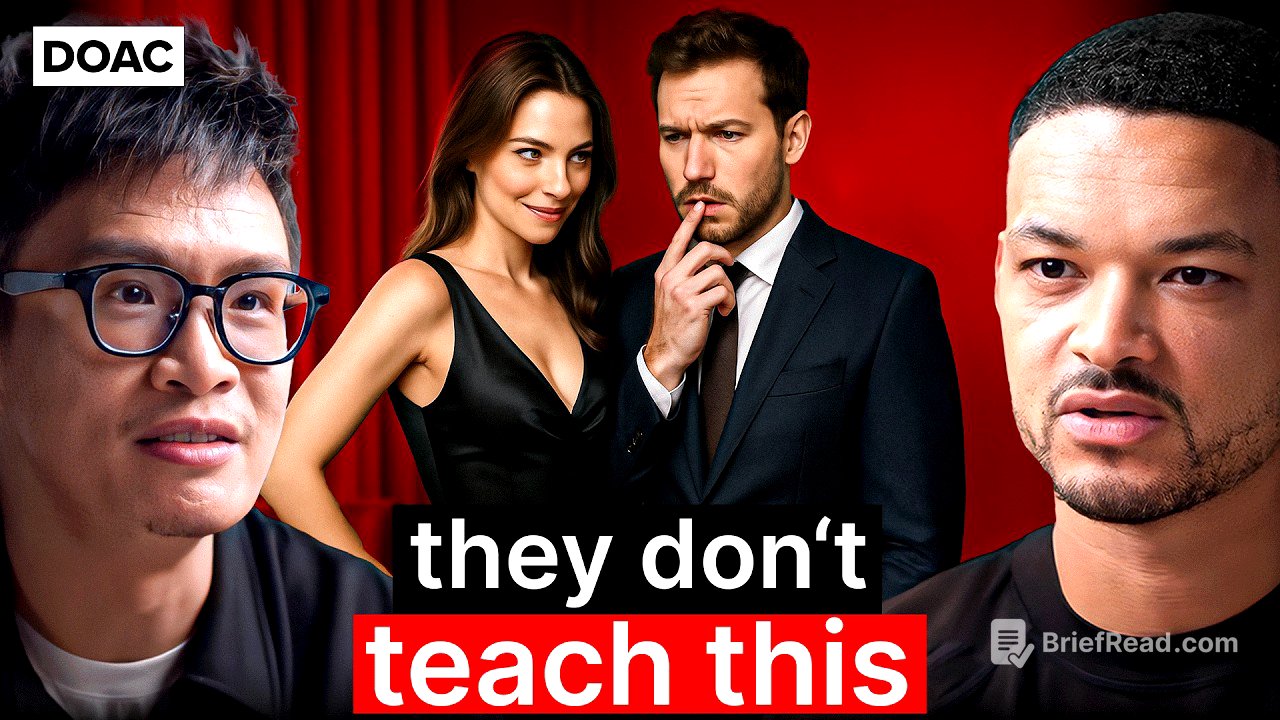TLDR;
This video explores the nuances of effective communication, emphasizing the importance of small talk, managing interruptions, building rapport, and understanding cultural differences. It introduces practical strategies like the "321" framework for small talk, techniques for increasing physical and vocal presence to avoid interruptions, and the FORD acronym (Family, Occupation, Recreation, Dreams) for deeper conversations. The discussion also covers the impact of cultural nuances on communication and the reasons why people dislike the sound of their own voice, offering solutions for desensitization and improvement. The core message is that mastering communication skills leads to contextual confidence and the ability to connect meaningfully with others, viewing energy as a valuable currency in social interactions.
- Small talk is crucial for building relationships, with 55% of relationships forming through casual interactions.
- Strategies like the "321" framework can help manage and navigate small talk effectively.
- Increasing physical and vocal presence can reduce interruptions.
- Cultural sensitivity is essential in communication, as norms vary significantly across different regions.
- Understanding and desensitizing oneself to one's own voice is key to improving communication skills.
The Importance of Small Talk [0:00]
Small talk is critical for forming relationships, with studies showing that over half of all relationships, both professional and personal, begin through these casual interactions. In the workplace, small talk constitutes a significant portion of conversations. To master small talk, the "321" method is useful: identify three steps, two types, or the one key thing related to the conversation topic. This approach helps keep the conversation brief and prevents it from turning into an unwanted, lengthy discussion.
Strategies for Effective Small Talk [0:22]
The "321" framework helps to navigate small talk by structuring responses into three steps, two types, or one key point related to the topic. For example, when asked about personal branding, one could respond by outlining the three steps involved, identifying two types of personal branding, or highlighting the single most important aspect. This method allows for a brief but informative response, followed by a polite exit from the conversation. Additionally, having a few prepared questions, such as "What do you do in your free time?", can open doors to more engaging and personal conversations.
Managing Interruptions in Conversations [2:20]
Interruptions often occur due to low physical and vocal presence. Increasing volume, using hand gestures, and employing power stances can establish a stronger presence, making it harder for others to interrupt. Standing during a meeting when making a point can also assert dominance of the floor. For serial interrupters, priming the conversation by stating the intention to share an idea and requesting uninterrupted time can be effective. If interruptions persist, politely but firmly reclaim the floor.
Building Rapport Through Mirroring [4:59]
Mirroring someone's body language and vocal style is a quick way to build rapport. Matching their energy and demeanor helps them feel more connected. It's important to meet people where they are and then gradually guide the conversation to where you want it to go. For instance, when someone approaches with a certain energy level, mirroring that energy initially can create a comfortable connection before transitioning to a different tone or topic.
The FORD Acronym for Deeper Conversations [6:23]
The FORD acronym—Family, Occupation, Recreation, Dreams—provides a framework for engaging in more meaningful conversations. Instead of defaulting to questions about occupation, exploring topics like family, hobbies, or dreams can create a deeper connection. Asking about someone's dreams, in particular, can lead to vulnerable and impactful conversations. This approach makes the interaction feel unique and memorable, fostering a stronger sense of connection.
Cultural Nuances in Communication [8:06]
Cultural sensitivity is crucial in communication, as norms vary significantly across different regions. What works in one culture may not be effective or appropriate in another. For example, a highly energetic and motivational speaking style common in America may not resonate well in more reserved cultures like those in Australia or the UK. Before speaking in a different country, it's important to research and understand the local cultural norms to avoid missteps and ensure effective communication.
Overcoming the Dislike of One's Own Voice [9:49]
People often dislike the sound of their own voice because they are used to hearing it through bone and muscle tissue, which creates a deeper, more resonant sound. When the voice is heard through the air, it sounds higher-pitched and less familiar. To overcome this, desensitization is key. Regularly listening to recordings of one's own voice helps to become accustomed to how others hear it. Recording and reviewing videos can also help identify areas for improvement in vocal delivery and body language.
Introversion, Extroversion, and Social Anxiety [12:17]
The difference between introverts and extroverts lies in how they gain or lose energy through social interaction. Introverts expend energy in social situations and need to be mindful of how they use it, while extroverts can sustain social interaction for longer periods. For those with social anxiety, desensitization through exposure therapy is recommended. Communication skills are invaluable because they can be applied in any context, fostering confidence in all areas of life.
Contextual Confidence and Energy as Currency [14:31]
Contextual confidence refers to feeling confident in certain situations or when discussing specific topics. Mastering communication skills can lead to consistent confidence across all contexts. Energy is a valuable currency in social interactions; being present and engaged requires conscious effort and expenditure of energy. By conserving energy and choosing when to invest it, one can give the best version of themselves. Building genuine connections and making people laugh can lead to unexpected rewards, highlighting the positive returns of investing energy in others.









